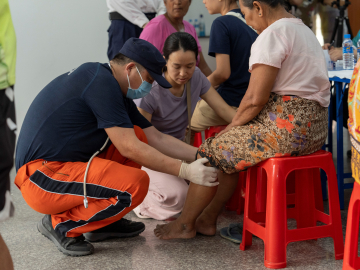Nutrition Improvements Require Stronger Commitments
Poor access to good or even adequate nutrition remains a global crisis. An estimated 11 million adults worldwide die each year from nutrition related diseases while 45% of deaths in children under 5 are linked to undernutrition. Women and children are disproportionally affected by poor diets and malnutrition, making this among the greatest societal challenges of our time, impacting health, economic output, and the environment.
These and other issues are reversing many of the gains we’ve made towards achieving good nutrition.
An enormous burden, therefore, rests on the global community in getting nutrition right, and as the 76th World Health Assembly gathers in Geneva to discuss Saving Lives, Driving Health for All, we must urgently address both the drivers and impacts of the nutrition crisis.
The good news is that there are reasons for optimism. Sustainable diets that put an end to malnutrition while preserving planetary health are an achievable and worthy goal. But to achieve them, sound decision-making, informed by data, and greater overall accountability are needed.
To accelerate action, the Global Nutrition Report (GNR) launched the Nutrition Accountability Framework (NAF). The NAF is the world’s first independent, comprehensive platform for registering “SMART”—specific, measurable, achievable, relevant, and time-bound—nutrition commitments and monitoring progress against them. For example, prior to Tokyo Nutrition for Growth (N4G) Summit in 2021, the NAF provided policymakers, donors, civil society organisations, and companies across the globe, an opportunity to make clear, trackable commitments for the first time. An unprecedented 432 commitments with 926 goals made by 205 Organisations have been registered and verified so far.
There are many commitments to celebrate. As highlighted in the 2022 Global Nutrition Report, stakeholders including governments, donors, civil society organisations, private sector and international organisations across the world have committed over $42.6 billion in resources.
Governments around the world have increased their national budget allocation for nutrition while civil society organisations, donors and donor organisations, and international organisations continue their key role of supporting governments on addressing the impacts of pandemic on food and health systems, on strengthening leadership and governance, and on ensuring key financial investments for tackling malnutrition in all its forms. Private sector stakeholders have a strong focus on adopting internal corporate policies aimed at transforming the food supply chain.
And it won’t stop there. The NAF will continue to encourage commitment makers to improve each year, providing common standards, tools, and guidance for measuring nutrition action. In the future, stakeholders who have registered commitments will be able to share progress reports, helping them highlight successes, share best practice, and learn from each other’s efforts. In doing so, the NAF will support stronger action and accelerate progress in tackling poor diets and malnutrition in all its forms.
As the nutrition community awaits the next N4G Summit, to be convened by the French government in Paris in 2024/2025, we must recognise the importance of accountability, and the value of tools such as the NAF. The need for policymakers and the global health community to step up and support policies and initiatives that provide better access to more nutritious food has never been more necessary.
It is only by having everyone’s contribution accounted for that we can deliver the change that people across the world need and deserve.
Shibani Ghosh and Giacomo Zanello are interim co-chairs of the Independent Expert Group of the Global Nutrition Report.
Join the 50,000+ subscribers in 170+ countries who rely on Global Health NOW summaries and exclusive articles for the latest public health news. Sign up for our free weekday newsletter, and please share the link with friends and colleagues.
Aerial view of workers growing water spinach on ecological floating beds at Chun'an County in Hangzhou, Zhejiang Province of China. VCG via Getty Images




